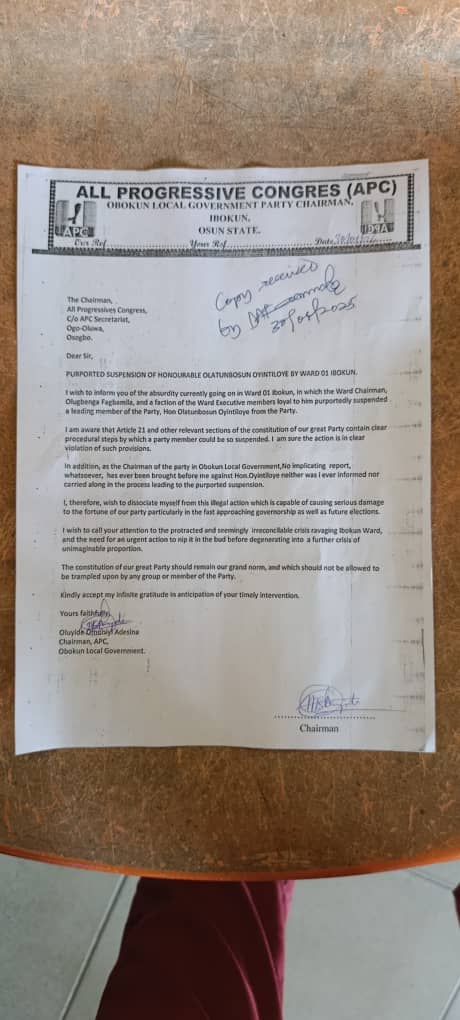VAM News Update
THE Court of Appeal has sacked Labour Party (LP) candidate, Olukayode Doherty, as the winner of the Lagos State House of Assembly, Amuwo-Odofin II Constituency election.
The court upheld an earlier ruling by the Election Petition Tribunal, which sacked Doherty and declared the All Progressives Congress (APC) candidate, Rauf Age-Suleiman, as the winner of the election.
The tribunal had ordered the Independent National Electoral Commission (INEC) to present Sulaiman with the certificate of return as the winner of the election.
The court held that the Electoral Act 2022 does not allow a candidate to be declared winner if the candidate did not fully participate in the election process.
Similarly, the Court of Appeal Sitting in Lagos has sacked Hon. Udefuna Chukwudi Labour Party as the member representing Ezeagu Constituency in Enugu State House of Assembly for not been able to meet the constitutional requirements.
The appellate court declared Rt. Hon. Chima Obieze of the Peoples Democratic Party, PDP winner of the March 18th election.
Obieze had challenged the declaration of Udefuna as the winner of the election on the grounds of invalid nomination; non-qualification and disregard for the 2022 electoral act.
On September 28th, 2023, the National and State Houses of Assembly Election Petitions siting in Enugu state upheld the Labour Party’s candidate, stating that his election followed the electoral act and he had the minimum requirement to contest for the election.
Obieze in his appeal, argued that position of Hon. Justice Adie Attoe led panel on the qualification of the Labour Party’s candidate; Udefuna Chukwudi is not only contrary to the 1999 constitution as amended, it’s also at variance with an existing judgement of the Supreme Court on a similar matter.
Obieze in ground one of his petition said that Udefuna was, at the date of the election/ not qualified to contest the election, in that he does not have the minimum academic qualification “school certificate or its equivalent” as stipulated by the constitution {Section 106 (c)}.
By the provision of Section 318 (1) of the constitution ((i.e.) the interpretation Section), defines “school certificate or its equivalent as used in Section 106 (c) as follows:
(a) A secondary school certificate or its equivalent, or Grade Il Teacher’s Certificate, the city and guild’s certificate; or
(b) Education up to secondary school certificate level, or
(c) Primary six school leaving certificate or its equivalent and:
Service in the public or private sector in the federation in any capacity acceptable to the Independent National Electoral Commission for a minimum of 10 years, and
Attendance at course and training in such institutions as may be acceptable to the Independent National Electoral Commission for periods totaling up to a minimum of one year, and
(iii) The ability to read, write, understand, and communicate in the English language to the satisfaction of the Independent National Electoral Commission, and
Any other qualification acceptable to the Independent National Electoral Commission.
Obieze further argued that from the above explanation, it’s evidently clear that a Primary Six School Leaving Certificate, simpliciter, does not qualify as a School Certificate or its equivalent, within the meaning of section 106 of the Constitution, as defined under section 318.
Thus, any person relying on Primary Six School Leaving Certificate, or its equivalent, as his qualification to contest for a seat in a State House of Assembly in Nigeria, must, in addition, satisfy all the three conditions listed under sub-paragraphs (i), (ii), and (iii) of paragraph (c) of section 31 8(1) of the.
Obieze further argued that the ruling of the tribunal is in variance with a Supreme court judgement. The apex court in Lado Anor vs. Masari Ors (2019) LPELR-55596 (SC), expounded the provisions of section 318(1)(c)(i)(ii)(iii) of the Constitution, and clarified that once a person who is relying on a Primary Six School Leaving Certificate or its equivalent is able to show that he also satisfied the conditions itemized under sub-paragraphs (i)(ii)(iii) of paragraph (c) of the definition of School Certificate in section 318(1) of the Constitution, such a person qualifies to contest any election in which the prescribed minimum qualification is School Certificate.
In that judgement, the Supreme court held that Masari was qualified having obtained a TCII certificate and have also served in the public institution for more than 10 years reinforcing the provision of the constitution.
The appeal court upheld Obieze’s appeal, stating that the respondent has not shown that he posses the minimum requirement of being able to read and write.
The court directed the Independent National Electoral Commission to issue certificate of return to Obieze.




